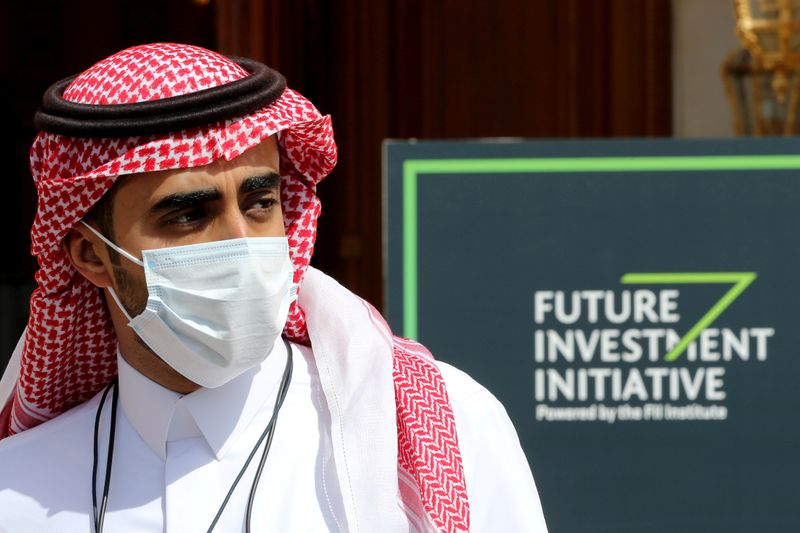By Marwa Rashad, Davide Barbuscia and Hadeel Al Sayegh
DUBAI (Reuters) - Saudi Arabia has raised the stakes in a competition with freewheeling Dubai for foreign talent and cash.
From 2024, the Saudi government will stop giving state contracts to companies and commercial institutions that base their Middle East hubs in any other country in the region, the Saudi finance minister told Reuters.
The measure is the latest attempt by the kingdom, a religiously conservative nation that is the birthplace of Islam, to remould itself as a financial and tourism hub under the leadership of de facto ruler Crown Prince Mohammed bin Salman.
But challenging the dominance of Dubai, in neighbouring United Arab Emirates (UAE), as the region's commercial and financial capital will not be easy.
With little of the oil wealth of its neighbours, Dubai has built its economy on its open-for-business credentials and the promise of a glitzy lifestyle for well-heeled expatriates.
"It's a further challenge to UAE business, especially Dubai, though the superior operating environment, legal environment and facilities (there) suggests that businesses may continue to have offices across the region," said Rachel Ziemba, adjunct senior fellow at the Center for a New American Security, a Washington think tank.
Still, the UAE is taking seriously the threat from Saudi Arabia, the largest Arab economy and the world's top oil exporter.
The UAE has already moved to make the country more attractive to foreign firms including allowing expatriates to divorce, cohabit and drink alcohol without a license.
Dubai's former finance chief Nasser al-Shaikh said Riyadh's move contradicted the principles of a unified Gulf market.
"Global experiences and history have proven that forced attraction is not sustainable," he tweeted following the Saudi announcement.
Saudi's finance minister told Reuters that Dubai and Riyadh would complement each other.
"This is not about Dubai or Abu Dhabi or any other city, this is about Saudi Arabia's right to have its fair share of regional headquarters," Mohammed al-Jadaan said.
Along with the ultimatum, Saudi Arabia is offering companies that set up regional headquarters in Riyadh zero corporate tax for 50 years, a waiver on mandatory quotes to employ Saudis for at least 10 years and potential favouring in government entities' tenders and contracts, according to a brochure by Invest Saudi, the country's investment brand overseen by the Ministry of Investment.
They would get relocation services, faster licence issuance and eased rules for work permits for spouses, it showed.
Some sectors would also be exempt from the decision to link state contracts to setting up regional headquarters, according to Jadaan. Detailed regulations will be issued before the end of 2021.
WORKAROUNDS
Saudi Prince Mohammed has pushed through social and economic reforms in his plans to modernise the Muslim kingdom and attract foreign investment to help diversify the economy away from oil. He has said he wants Riyadh to become a global city by 2030.
The crown prince has eased restrictions on concerts, allowed women to drive and ended a 40-year ban on cinemas, dramatic steps for Saudi Arabia. But Dubai already boasts multiplexes, nightclubs and world-class beachfront hotels that, when the pandemic is not raging, attract millions of visitors each year.
Meanwhile, Saudi projects such as the King Abdullah Financial District, planned since 2006 to house banks across an area roughly four times the size of London's Canary Wharf, have yet to take off and attempts to lure foreign capital outside the energy sector have faltered in recent years amid political controversy, an opaque legal system and the coronavirus crisis.
The UAE has spent years attracting businesses and shifting to Riyadh after decades in Dubai would be difficult, bankers told Reuters.
One said some financial institutions with offices in Saudi Arabia could rename them as regional headquarters while maintaining a presence in Dubai. "The amount of business that's generated from the government needs to be justified," the banker said. "For an investment bank, there's no revenue to justify the move."
Karen Young, a resident scholar at the American Enterprise Institute, told Reuters the Saudi move could encourage "workarounds that defeat the purpose and don't create growth."
Franklin Templeton, which has offices in the UAE and Turkey, said it was awaiting more details on Riyadh's proposed rules.
"With further information on the new regulations planned to be issued this year, we will be monitoring this closely to evaluate our approach," the investment firm said. Foreign banks such as HSBC, JPMorgan (NYSE:JPM) and Citigroup (NYSE:C), which are based in the Dubai International Financial Centre (DIFC), declined to comment.
For technology companies bidding for business as Prince Mohammed pushes on with plans for a $500 billion business zone on the Red Sea, however, an office in Riyadh may make strategic sense.

"Expanding in Saudi Arabia is a way to advance a company’s chess pieces in the Middle East: it's strategy," said Sam Blatteis, a former head of government relations at Google (NASDAQ:GOOGL) for the Gulf and CEO of The MENA Catalysts, a consultancy.